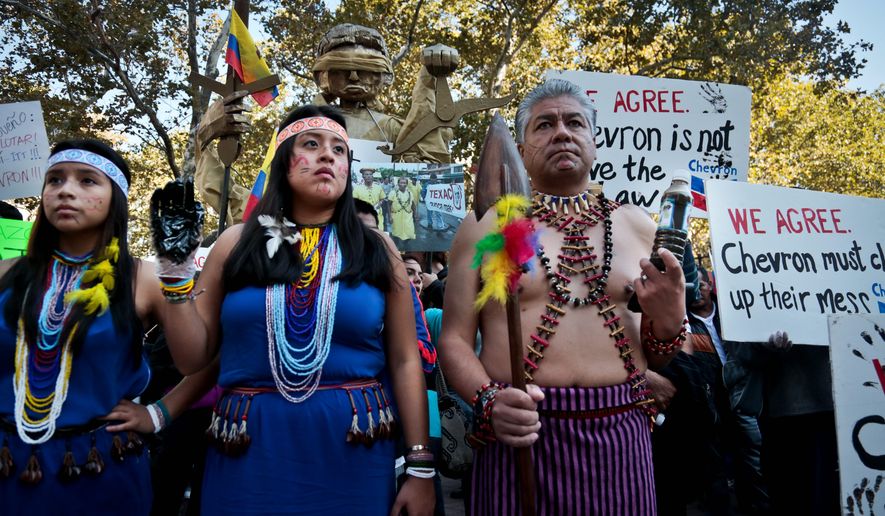A federal appeals court refused Monday to enforce a corruption-riddled $9.5 billion judgment obtained in Ecuador against Chevron Corp., letting stand a lower-court decision holding that the award was tainted by “coercion, fraud and bribery.”
A three-judge panel of the 2nd U.S. Circuit Court of Appeals in Manhattan found “no basis for dismissal or reversal” of the March 2014 decision by U.S. District Court Judge Lewis A. Kaplan, who ruled that U.S. lawyer Steven Donziger used “corrupt means” during the rainforest-contamination trial.
The judge determined that Mr. Donziger had violated the Racketeer Influenced and Corrupt Organizations Act [RICO] by fabricating environmental evidence against Chevron, paying off consultants and impartial experts, offering a $500,000 bribe to an Ecuadorean judge, and writing the final judgment.
Chevron vice president and general counsel R. Hewitt Pate said in a statement Monday that the company is “pleased that the truth has prevailed over fraud and corruption.”
“This decision, which is consistent with the findings of numerous judicial officers in the United States and South America, leaves no doubt that the Ecuadorean judgment against Chevron is the illegitimate and unenforceable product of misconduct,” Mr. Pate said.
Karen Hinton, a U.S. spokeswoman for the plaintiffs and former aide to New York City Mayor Bill de Blasio, said the Equadoreans were “shocked” by the decision and would consider “all options for further appeal.”
“As disappointed as we are, this ruling will not deter the Equadoreans, their lawyers and their supporters from aggressively seeking justice in Canada and in other countries where litigation is underway to seize Chevron assets,” said Ms. Hinton, who also is affiliated with the environmental group ChevronToxico.
“With those assets, the Equadoreans will be able to undo some of the damages Chevron left behind — damage that has ruined the pristine rainforest and taken the lives of men, women and children who depend on the rainforest for the basic necessities of life,” she said.
Mr. Donziger sued Chevron on behalf of residents of Ecuador’s Lago Agrio region for water and soil damage allegedly caused by Texaco, which Chevron bought in 2001, during exploration and extraction activities from 1964 to 1992.
Chevron has argued that the company met its obligations after spending $40 million on a clean-up effort as part of a 1998 deal with Ecuador, and that the state-run company PetroEducador, which took over after Texaco exited, also bears responsibility.
Chevron officials also say the company has never operated in Ecuador, while Texaco was a minor partner in the energy venture with PetroEcuador.
Attorneys for the 30,000 Lago Agrio residents insisted their clients should still receive the award and not be held accountable for the misconduct of the legal team, but the court in its unanimous decision disagreed.
“There is no authority suggesting that a party ignorant of its attorney’s fraudulent actions may enforce a fraudulently procured judgment,” said the decision by Judge Amalya Kearse. “Even innocent clients may not benefit from the fraud of their attorney.”
Deepak Gupta, who represents Mr. Donziger, decried the Monday decision as “unprecedented in American law.”
“Never before has a U.S. court allowed someone who lost a case in another country to come to the U.S. to attack a foreign court’s damages award,” Mr. Gupta said in a statement. “The decision hands well-heeled corporations a template for avoiding legal accountability anywhere in the world.”
An Ecuadorean judge entered an $18 billion judgment against Chevron in 2011 on behalf of the Lago Agrio plaintiffs, a verdict upheld three years later by Ecuador’s high court but reduced to $9.5 billion.
• Valerie Richardson can be reached at vrichardson@washingtontimes.com.




Please read our comment policy before commenting.